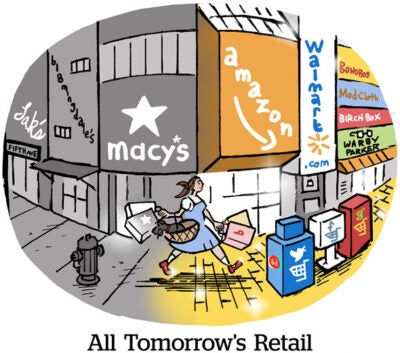ShopLovin
Seemingly everyone is making a push into retail media nowadays. But most don’t have enough data and inventory to make it work, like Google and Meta do. TikTok, Snap, Pinterest, Walmart and other huge media and data companies are sub-scale by the standards of achieving consistent, powerful online ROI.
AppLovin might be the next breakout, though. The mobile gaming ad platform began piloting an ecommerce advertising solution earlier this year and had seriously optimistic reports during its quarterly earnings Wednesday.
Ecommerce is a whole new category for AppLovin, and it’ll take time to reach 10% or total platform revenue even after its general launch, said CEO Adam Foroughi. Right now, for instance, there is no seasonality to AppLovin’s results, he said. When the ecommerce business has scaled, AppLovin will reflect seasonal ecommerce patterns.
But the early results are motivating.
“We’re all hands on deck, both on the business side and the engineering side on this ecommerce scale-out,” he said. “It’s just so compelling that it’s taken all of our resources now.”
Pilots are easy, though. With a self-service commercial solution, many more brands will be in competition for the inventory, driving down potential ROI for early testers.
Beta To Alpha
Speaking of sub-scale platforms, Adweek reports that some advertisers have turned off TikTok Smart+ – TikTok’s version of Google’s Performance Max or Meta Advantage+ Shopping.
Smart+ came out of testing in October and is delivering inconsistent results, sources say. The platform doesn’t scale up campaigns at the ROI advertisers can achieve elsewhere (which is to say, with Google or Meta).
Going from a testing mode to general release is tough, though. Facebook Advantage+ Shopping, as it was known, had a weird half-open beta for a year. Brands requested access, but were approved in seemingly random fits and spurts. As the product expanded, Facebook had to carefully manage each category. Too many men’s clothing brands, for example, and none will have a shining ROI.
Meta Advantage+ is now widely available and a key part of the company’s growth picture. But even for Meta, it wasn’t easy to get that kite in the air, so to speak.
TikTok Smart+ pilot brands saw strong returns for a few weeks, but that’s now plateaued and declined, says Tinuiti Senior Social Innovation Director Jack Johnston. “It’s not normal for a product that’s working one minute to flip and not work the next.”
That’s the post-beta thud.
Fold A Losing Hand
Mobile industry analysts and product reviewers are waiting, waiting and wondering why Apple isn’t making a foldable phone, writes CNET.
There is a large, global trend of foldable phone sales, and other phonemakers have noted that many new buyers are former iPhone owners taking a big step back in price or perhaps in-app usage.
However, a counterpoint is that Apple doesn’t necessarily care about this growing trend in the hardware sales category, because its business profile is shifting from hardware sales to services, which are Apple’s fees and commissions on earnings by iOS apps.
If people using foldable phones don’t watch and sign up for streaming services, film videos, subscribe to the news, online date, shop, plan trips, read books, etc., then it’s a lot less interesting for Apple.
In comparison, Apple invested heavily competing directly with Meta on VR hardware, despite headsets being a low-sales category. But if Meta might siphon people who use its VR operating system to shop, consume media and the like, that has Apple’s attention.
Foldable phones, not so much.
But Wait! There’s More!
Paramount+ is launching its own UK ad tier. [Campaign]
South Korea fines Meta $15 million for collecting sensitive user data. [Reuters]
The number of ad tech mergers and acquisitions is growing more steadily. [Digiday]
Capcut, the short-form video editing app developed by ByteDance, released a set of new creative ecommerce tools. [blog]












